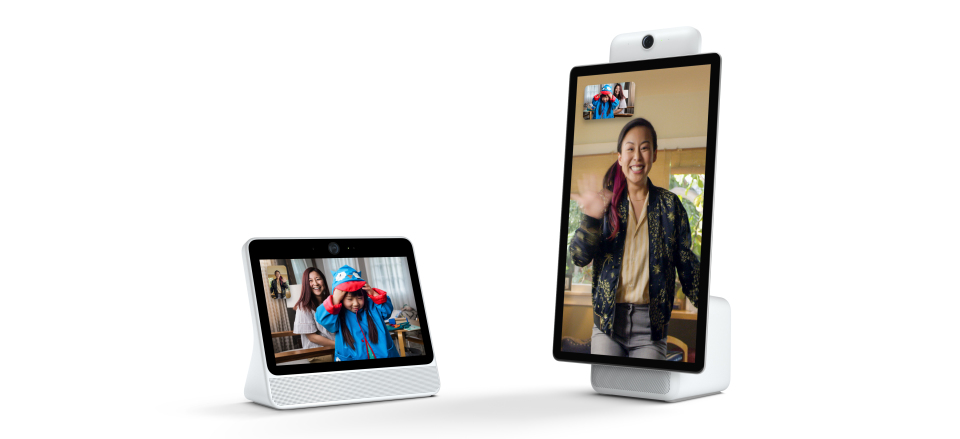Yesterday, Facebook launched two brand new video communication devices. Named Portal and Portal+, these devices let you video call anyone, with more richer, hands-free experiences. The Portal features a 10-inch 1280 x 800 display, while Portal+ features 15-inch 1920 x 1080. Both devices are powered by Artificial Intelligence.
This includes a Smart Camera and a Smart Sound technology.
- Smart Camera stays with the action and automatically pans and zooms to keep everyone in view.
- Smart Sound minimizes background noise and enhances the voice of whoever is talking, no matter where they move.

Source: Facebook
Portal can also be used to call Facebook friends and connections on Messenger even if they don’t have Portal. It also supports group calls of up to seven people at the same time.
Portal also offers hands-free voice control with Amazon Alexa built-in which can be used to track sports scores, check the weather, control smart home devices, order groceries, and more. Facebook has also enabled shared activities in its Portal devices by partnering with Spotify Premium, Pandora, iHeartRadio, Facebook Watch, Food Network, and Newsy.
Keeping in mind, it’s security breach that affected 50 million users two weeks ago, Facebook says it has paid a lot of attention to privacy and security features.
Per their website,
“We designed Portal with tools that give you control:
- You can completely disable the camera and microphone with a single tap.
- Portal and Portal+ also come with a camera cover, so you can easily block your camera’s lens at any time and still receive incoming calls and notifications, plus use voice commands.
- To manage Portal access within your home, you can set a four- to 12-digit passcode to keep the screen locked. Changing the passcode requires your Facebook password.
We also want to be upfront about what information Portal collects, help people understand how Facebook will use that information and explain the steps we take to keep it private and secure:
- Facebook doesn’t listen to, view, or keep the contents of your Portal video calls. In addition, video calls on Portal are encrypted.
- For added security, Smart Camera and Smart Sound use AI technology that runs locally on Portal, not on Facebook servers. Portal’s camera doesn’t use facial recognition and doesn’t identify who you are.
- Like other voice-enabled devices, Portal only sends voice commands to Facebook servers after you say, “Hey Portal.” You can delete your Portal’s voice history in your Facebook Activity Log at any time.”
In all the above, Facebook seems quite cryptic about audio data. It also doesn’t really explain how it will use the information it collects from users. The voice data is stored on the Facebook server by default, probably to improve the Portal’s understanding on the user’s language quirks and to understand the user’s needs from the data. But it does make one wonder, should this be an opt-in and not an opt-out by default?
Another jarring aspect is the need for one’s Facebook password to change the device’s passcode. This just feels like the new devices are yet another way for Facebook to add users to Facebook, not to mention the fact that Facebook just had a data breach on its site, the repercussions of which they are still investigating.
In an interesting poll conducted by Dr. Jen Golbeck, Professor at UMD, on Twitter, over 63% of respondents said that they will not trust Facebook to responsibly operate a surveillance device in their home.
Who here trusts Facebook to responsibly operate a surveillance device in their home?
— Dr. Jen Golbeck (@jengolbeck) October 8, 2018
Read more about the devices on Facebook’s announcement.
Read Next
Facebook Dating app to release as a test version in Colombia.
Facebook’s Glow, a machine learning compiler, to be supported by Intel, Qualcomm and others










![How to create sales analysis app in Qlik Sense using DAR method [Tutorial] Financial and Technical Data Analysis Graph Showing Search Findings](https://hub.packtpub.com/wp-content/uploads/2018/08/iStock-877278574-218x150.jpg)